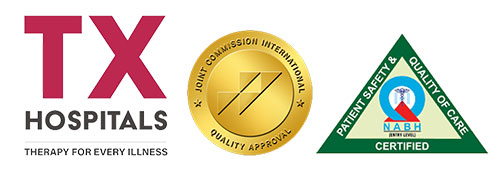Introduction
Otolaryngology, commonly referred to as the ENT (Ear, Nose, and Throat) department, is a specialized field of medicine focused on the diagnosis and treatment of conditions affecting the ear, nose, throat, as well as disorders pertaining to the head and neck. TX Hospitals, is the one of the best hospitals for ENT treatment
Scope
Ear (Otology): Dealing with conditions affecting the ear, such as hearing loss, ear infections, balance disorders, and tumors of the ear and skull base.

Nose (Rhinology): Specializing in disorders of the nose and sinuses, including chronic sinusitis, nasal polyps, nasal obstruction, and nasal allergies.
Throat (Laryngology): Focused on disorders of the throat, voice, and upper airway, such as vocal cord nodules, laryngitis, swallowing disorders, and airway obstruction.
Head and Neck: Addressing tumors, cancers, and other conditions affecting the head and neck region, including the thyroid, salivary glands, and lymph nodes.
Pediatric Otolaryngology: Concentrating on ENT issues specific to children, such as ear infections, tonsillitis, congenital abnormalities of the head and neck, and pediatric airway disorders.
Services
Diagnosis: Conducting comprehensive evaluations, including physical examinations, imaging tests (like CT scans and MRIs), and specialized diagnostic procedures (such as endoscopy).
Treatment: Offering various treatment modalities, including medication management, surgical interventions, rehabilitation services, and counseling for patients with ENT-related conditions.
Procedures: Performing a wide range of procedures, including ear tube placement, tonsillectomy, sinus surgery, vocal cord surgery, thyroidectomy, and head and neck cancer surgery.
Collaboration: Working closely with other medical professionals, such as audiologists, speech therapists, allergists, neurologists, and oncologists, to provide multidisciplinary care for patients.
Key Professionals
Otolaryngologists (ENT doctors): Physicians specialized in diagnosing and treating ENT disorders.
Audiologists: Professionals trained in evaluating and managing hearing and balance disorders.
Speech-Language Pathologists: Specialists who assess and treat communication and swallowing disorders.
Head and Neck Surgeons: Surgeons specializing in complex procedures for head and neck cancers and other conditions.
Conclusion
The ENT department plays a crucial role in diagnosing and treating a wide range of conditions affecting the ear, nose, throat, head, and neck. With its multidisciplinary approach and comprehensive services, it aims to improve patients’ quality of life by addressing their ENT-related health concerns effectively.







